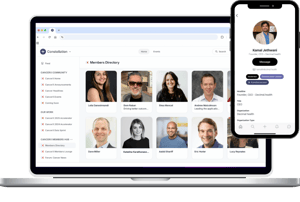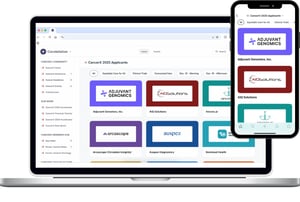
Navigating the US Digital Health Market: Key Challenges for European Companies
The United States remains an attractive market for European digital health companies looking to expand their global footprint. The global digital health market was estimated at USD 288.55 billion in 2024 and is projected to grow at a CAGR of 22.2% from 2025 to 2030, reaching USD 946.04 billion by 2030.
The market is driven by factors such as strong domestic infrastructure for telehealth platforms, mHealth app providers, and wearable device manufacturers, alongside supportive government initiatives. The US digital health market specifically was valued at approximately USD 123.6 billion in 2024, representing a significant portion of the global market. This growth is fueled by high integration of sophisticated technologies among healthcare providers, robust regulatory support, and substantial healthcare spending in the country. Despite these favorable market conditions, European digital health companies still face significant hurdles when expanding into the US.
Securing regulatory approval from the US Food and Drug Administration (FDA) remains a vital pathway for entering the US digital health market and establishing credibility with potential buyers, partners, and investors. Unlike Europe's fragmented regulatory landscape, the FDA serves as the single organization responsible for regulating digital health products used to treat, manage, or prevent disease across the entire US. Understanding the optimal regulatory pathway is crucial. The FDA continues to evolve its approach to digital health regulation through its Digital Health Center of Excellence, which aims to provide efficient and least burdensome oversight while maintaining standards for safe and effective products. Their objectives include advancing science and evidence for digital health technologies, providing specialized expertise to accelerate access, and creating a harmonized regulatory approach aligned with international expectations.
For digital health companies, not only is obtaining regulatory approval essential, but achieving this milestone in a timely and cost-efficient manner is crucial to ensure the company starts generating revenue before running out of resources. The FDA offers several regulatory pathways, including the 510(k) clearance process for Class I and II devices that have substantial equivalents already on the market (typically taking around 105 days), the De Novo pathway for novel Class I and II devices without predicates (approximately 248 days), and the Premarket Approval process for higher-risk Class III devices (about 210 days). The difference between approval and rejection often resides in nuances within the submitted claims and documentation, making a well-thought-out submission strategy essential to avoid costly delays.
The US healthcare system remains fragmented with fundamentally different incentives than those in Europe. Unlike many European countries, the US does not have a universal healthcare system but rather multiple intersecting health systems. Understanding these differences is critical for European companies aiming for successful market entry. First, identify who would use your solution—determine where you fit in existing workflows and who has an unmet need. For instance, if launching a prevention-focused digital health solution targeting hospital chains, recognize that different healthcare delivery models in the US have varying incentives and reimbursement structures. A prevention solution may appeal to organizations in value-based care settings but might struggle to gain traction in fee-for-service environments.
Defining which customer segment(s) to target is equally important. Depending on your solution, it could be more advantageous to focus on care providers, payers, employers, pharmaceutical companies, or patients directly. Across these segments, understanding who will pay for or reimburse your solution is paramount. Reimbursement for digital health products is more complex in the US than in Europe. In Germany, for example, the Digital Healthcare Act created a streamlined approval and reimbursement process, known as the DiGA process, which enables quick reimbursement through the National Association of Statutory Health Insurance Funds. This framework allows approved digital health apps to be prescribed by any physician to the 73 million statutory health-insured German citizens. This centralized reimbursement mechanism does not exist in the US. Instead, digital health companies must navigate unique, ad-hoc contracts with various payers like the Centers for Medicare and Medicaid (CMS) or commercial health insurance plans such as Blue Cross Blue Shield and United Healthcare.
Entering the US healthcare market demands a sound implementation strategy and significant financial and time investment. Securing FDA approval requires substantial investment in proper clinical trials to demonstrate safety and clinical effectiveness. Beyond regulatory considerations, new entrants benefit significantly from having a local presence in the US. There are multiple approaches to establishing this presence, such as building a local team or partnering with a company that facilitates commercialization. Companies are advised to bring someone onto their leadership team who understands the local US market and the effort required for successful expansion.
While challenges exist, European digital health companies should not be discouraged from entering the US market. The US digital health sector is expected to reach USD 248.11 billion by 2034, growing at a CAGR of 11.64% from 2025 onwards. This growth is driven by factors including the rising demand for accessible and convenient healthcare, expanding telehealth adoption, and ongoing technological advancements. For comparison, Europe's digital health market was estimated at USD 125.62 billion in 2024 and is predicted to reach USD 333.30 billion by 2034, growing at a CAGR of 10.25%. This makes the US an appealing expansion target despite its challenges. The US healthcare market continues to be an exciting, dynamic place with a growing need for innovative digital health solutions that improve patient health outcomes.
SCHEDULE A MEETING WITH AN EXPERT
Ready to innovate? Decimal Health is standing by to assist with your next Digital Health venture.
.png?width=125&height=125&name=logo_wt%20(3).png)






.png?width=300&name=CancerX%20Decimal%20Banner%20(2).png)